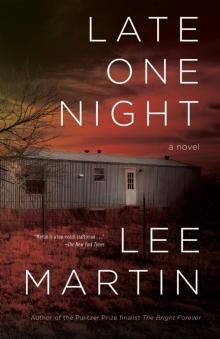- Home
- Lee Martin
The Bright Forever Page 5
The Bright Forever Read online
Page 5
“A thousand?” Mr. Dees said to Raymond R. “That’s a lot of money.”
Raymond R. nudged the Cooper’s hawk with his boot. “Teach,” he said. “I thought we were friends. I swear I don’t know anyone else to turn to. I thought I could count on you. That’s what folks say: You can always count on Henry Dees.”
“It’s against the law to kill a hawk.” A car drove past, and Mr. Dees wondered whether the driver had caught a glimpse of him and Raymond R. “That Cooper’s hawk. It’s protected.”
“Didn’t you want it gone?” Raymond R. squinted at Mr. Dees the way boys did when they were trying to figure out a math problem. “Jesus in a basket. I thought you’d be glad. You want something gone, by God, you go get it. Isn’t that the way?”
“You shouldn’t have shot it.”
“It’s just the two of us.” Raymond R. laid a hand on Mr. Dees’s shoulder. He leaned in close and whispered, “We’re the only ones who have to know.”
At the Mackeys’, Katie sat on the edge of a dining room chair, her bare feet curled over the bottom rung. She had red polish on her toenails. Mr. Dees had noticed that right away when she came downstairs for her lesson, and even now he could smell the polish. He didn’t approve. Nail polish for a nine-year-old. What sense did that make? He wondered whether he should say something to Mrs. Mackey, then thought better of it, understanding that he was there to teach arithmetic and not to offer advice on parenting. Him, the bachelor. Him, the odd duck. Oh, he knew how people talked. What in the world could he possibly know about raising a child?
He uncapped his fountain pen and tapped the nib beside the problem he had neatly written on a tablet page. He took great pride in his penmanship. It looked, so the teller at the savings and loan had remarked yesterday, like something out of a handwriting instruction book. “A careful man writes a careful hand,” his mother had taught him, and he had practiced the Palmer Method until each letter was perfect. “Just look at your signature on this deposit slip,” the teller had said. “You’d think a woman signed it. Not many men have pretty writing like that.”
If a herd has fifty-six zebras, and someone wants to separate a fourth of them from the herd, how many will he have to move?
A story problem requiring work with fractions. Solving story problems, Mr. Dees told Katie, was a matter of translating a word sentence into a number sentence: 56/1 X 1/4 in this instance. “You see, we have fifty-six zebras.” His pen scratched over the pad as he wrote the equation. Katie was fascinated with the pen. Could she hold it? she wanted to know. Could she use it to work out the problem? “If you get this problem right,” Mr. Dees said, “I’ll let you use the pen. In fact, if you get this right, I’ll buy you one of your own. Now, fifty-six zebras, and we have to take a fourth of them away.” He held his eyeglasses at the left temple, straightening them. His hair—he had again let it grow too long—flopped over his forehead, and he had to lay his pen down and use his fingers to comb the hair out of his eyes. The air around him smelled of ink and paper and Katie’s shampoo—the delightful scent of strawberries—and that nail polish that Mr. Dees couldn’t get out of his head.
Katie tapped her teeth with her pencil’s eraser. “Fifty-six zebras,” she said. “Holy moly, that’s a lot of stripes.”
“Katie.” Mr. Dees gently closed his fingers around her wrist and moved her hand away from her mouth. “Concentrate. How would you multiply fifty-six by one-fourth?”
“I’d times the top numbers and the bottom numbers.”
“What do we call the top numbers?”
“The numerators.”
“Good. And the bottom?”
“The nominators.”
“De-nominators,” Mr. Dees said.
“De-nominators.” Katie drew an equal sign at the right of the equation and then wrote the fraction 56/4. “Fifty-six times one,” she said, “equals fifty-six, and one times four equals four.”
“Yes. Good. Now what do you have to do?”
“Simplify.”
“Right. And how do you do that?”
“Divide fifty-six by four.” Katie leaned over the tablet, her hair falling down across her arm as she worked the problem. “Four goes into five once with one left over. Bring down the six. Four goes into sixteen four times.” She slapped her pencil down on the tablet and grabbed Mr. Dees around his arm. “Fourteen zebras,” she said. “Holy moly, Mr. Dees. Fourteen.”
The look on her face—a look of unexpected pleasure—overwhelmed him. What delight there was in her eyes, in her open mouth, in the way her warm fingers curled across his arm. Had fractions ever blessed a child to this degree? It was as if she had been lost in darkness and now had come out into the light, saved. Holy moly. What could he do, but take her hand in his and lift her arm and declare her “Katie, Champion of Fractions,” and to hand over his pen to her, as he had promised, so she could use it to figure out the next problem.
“You said you’d buy one for me, Mister Dees.”
He told her he would. He surely would.
Even as he celebrated this joy, he felt a pang of sadness creep over him. He knew he would rise soon and go back to Gooseneck, and Katie’s life—the one with her family—would go on without him. He imagined the voices sounding in this house, the bodies in motion, while in Gooseneck he played his records, prepared his lessons, and gorged himself on food that never made him fat. Years from now, when Katie was a grown woman, she might vaguely remember the summer he taught her fractions, but his brief presence would be an insignificant part of the whole. He was a shadow thrown briefly on a wall. He could never have the substance or worth that her mother and father did, her brother, the boys who would love her, the children she would have.
Mrs. Mackey came into the room, drying her hands on a dish towel. “My word,” she said. “What’s all the to-do?”
It was nothing, Mr. Dees told her. It was just Katie learning fractions.
“Mama, look at this pen,” Katie said. “Mister Dees is going to buy one for me.”
Before Patsy Mackey could answer, Mr. Mackey, home for lunch, was at the back door calling. “Patsy, Katie, come quick.”
The air stirred about Mr. Dees as Katie let the fountain pen drop to the table, and she and her mother rushed out of the dining room. He capped his pen and gathered up his tablet. What was it, he wondered, that made someone necessary, never to be forgotten? Wasn’t it the loving? Wasn’t it people looking out for one another? Wasn’t it family? Husband/wife, sister/brother, parent/child. “Come quick,” Mr. Mackey had said, and Katie and her mother had run to him. But what if one’s life—choices made, circumstances accrued—had rendered such a scene impossible, left someone, as in the case of Mr. Dees, standing to the side, separated from the clan?
He had been the only child born to parents already past the middle of their lives: his mother nearly fifty, his father the same. A miracle it was, people said, this child. But to Mr. Dees, when he thought back on the way life had been with his parents, it always seemed that he was more of an intruder than a miracle. As he grew older, he realized two things: his parents had never intended to have children and, once they did, they didn’t know what to do with him. He remembered one time, when he was around the age that Katie was now, walking into Helene’s Dress Shop downtown with his mother and hearing the saleslady say, “My, my. Isn’t your grandson a sweetheart?” His mother offered no word of correction. “I need a pair of new white gloves,” she said. (Whenever she went out, she wore white gloves and a broad-brimmed hat covered with artificial flowers.) He understood from the way she squeezed his hand that he, too, was to keep quiet. What he knew about family was this: his wasn’t normal. He had come to his parents too late in their lives, and they had little patience with him. “Shh, shh, shh,” his mother was always cautioning. The words of wise men, she said, were heard in quiet. It said so in the Bible. The meek shall inherit the earth. She taught him scripture. “It is good,” he repeated, “that a man should both hope and quietly wait for the salv
ation of the Lord.” He learned to think before he spoke, to be careful, respectful, not knowing that at the same time he was learning to love by leaving people alone.
Outside, in the Mackeys’ driveway, Katie was squealing. She was jumping up and down and clapping her hands together and shrieking as her father lifted a bicycle from the bed of his pickup truck. Mr. Dees watched from the back door. Just a moment, he thought. He would stay just a moment and then let himself out the front door and leave the Mackeys to their excitement. The bicycle was one of those Sting-Ray bikes that Mr. Dees had seen the boys and girls riding that summer. They sat low and had long banana seats. He had lingered in the Western Auto Store one afternoon, listening to the salesclerk explain the features. He had picked up the names of all the parts: the banana seat, the sissy bar that rose up behind it, the high butterfly handlebars, the sparkly silver streamers flowing out from the handgrips. A Sting-Ray. A twenty-inch Sting-Ray. Katie was riding hers in a circle in the driveway, and Mr. Mackey was standing by his truck, his hands on his hips, a grin on his face. Mr. Dees understood that Junior Mackey was pleased that he had been able to give Katie that bike. Mrs. Mackey turned back to the house—perhaps she had thought to run in and grab the Polaroid or the movie camera—and Mr. Dees was sorry for her to have to see him there, watching from behind the door. He stepped back, meaning to move quickly through the house, to make his escape, but the tablet slipped from his hand, fell to the floor. He stooped to retrieve it, and he heard the back door open, and then Mrs. Mackey was there, saying, “My goodness, we forgot all about you.” He thought for a moment that she meant to invite him to come out to the driveway and watch Katie ride her new bike. Then she said, “Here, let me write you a check. I think we owe you for three sessions this week. Yes?”
Before he could stop himself, he said what had been on his mind all the time he had been coming to the Mackeys’. “She’s a pretty girl, your Katie. A precious, pretty girl.”
The look on Mrs. Mackey’s face changed. Her smile faded. Her eyebrows came together as she squinted at him. He understood that if anyone else had said what he had it would have been an innocent compliment, the kind parents make about other people’s children all the time, but from him it sounded wrong. It sounded like what it was, an expression of love from someone who had no right to make it. He tried to say something else, something that would assure Mrs. Mackey that his interest in Katie was merely that of a teacher, a teacher who was concerned about the way young boys and girls grew up and became responsible adults. “That nail polish,” he said. “Isn’t she too young?”
But that only made matters worse. “Little girls play with makeup,” Mrs. Mackey said. “They play dress-up. They put on their mother’s nail polish.” She said all this in a way that made it clear that she thought she shouldn’t have to say it. Mr. Dees should know as much. “I don’t know what you think—”
He cut her off before she could finish. He didn’t want to hear what she was about to tell him. “Yes, three,” he said. “You’re right, but don’t worry. You can pay me another time.” He looked back out to the driveway where Katie was still riding her new bike. “I don’t want to keep you from your family,” he said. “Go on. I’ll let myself out the front.”
When he stepped out onto the porch, he could still hear Katie’s excited squeals, and he heard them as he turned toward home and for a good ways up the street, and he hated himself for not being able to tell Mrs. Mackey, or Raymond R. earlier, what he had really wanted to say. I don’t want to hurt anyone. I don’t. Please help me.
Mr. Dees
I BOUGHT THAT pen for Katie, and when I gave it to her, she hugged me around my waist. I dreamed of her. I won’t deny it.
Raymond R.
MAYBE I STOLE those cement blocks. Sure, I’ll own up to that. But, brother, that’s all. You can ask my wife.
Clare
SO HE BUILT that porch. Night after night, he was out there laying blocks, and I was pulling weeds from the flower beds, the two of us talking back and forth to each other the way married folks do, and the only one who ever stopped to visit was Henry Dees.
He came one evening just after supper. I was sitting on a kitchen chair in the yard snapping beans, a mess of Kentucky Wonders one of the girls who worked at Brookstone Manor had brought me from her mother’s garden. There were people there, you see, who cared for me—high school girls who called me Gram. They didn’t live in Gooseneck. For the most part they were girls from the Heights, holding down summer jobs, making a little spending money working at the nursing home. They had long hair that they had to tie back in ponytails or put up in hairnets if they worked in the kitchen, and they had tans from going to the swimming pool on their days off. Their boyfriends came by to get them after work, and I saw the way they flirted. They wrote the boys’ names on their paycheck envelopes and drew hearts around them. In the laundry, they played the radio, and I went home with their tunes in my head. I caught myself singing their words, and when I did, I felt the way I did that night at the Top Hat Inn when Ray kissed my hand. I was, as the girls at Brookstone Manor said about themselves, in L-U-V.
I was humming one of those songs to myself the evening Henry Dees came to see Ray. It was a song the girls sang over and over that summer, “Betcha by Golly, Wow,” a song about being in love forever. Oh, I know it sounds silly. An old dame like me. But that was the truth of my life then.
You have to know how wonderful it can be in summer in that part of Indiana. Early summer, I mean, before the heat comes and the muggy air. Bobwhites call from the meadows, and mourning doves coo. Chicory blooms on roadsides—patches of blue—and the brown-eyed susans put on their yellow pinwheels. The monarch butterflies come to feed on the milkweed, and hummingbirds hover over the orange-red bells of the trumpet creeper. It’s enough, my mother used to say, to make you sing at the kitchen pans. “That’s from a poem,” she told me. “I learned it in school.” Summer, she said—the heart of summer—it was enough to make you shout all over God’s Heaven.
Henry Dees spooked me. My head was full of that song, and I was bent over those beans, snapping them one, two, three, and he said my name. “Clare,” he said, and I near jumped out of my skin.
He was fiddling with his eyeglasses, trying to get them to set right on his face. He took them off and messed with the left temple. Then he gave up and put the glasses back on and left them to sag.
“You ought to go into Blank’s,” I told him. “Get those glasses straightened up. They’ll do it for free.”
“Screw’s loose.” He put a finger under that left temple and jiggled it up and down, showing me the play. “I thought maybe Ray had a screwdriver.”
“Itty-bitty screwdriver?” I said. “Well, I expect he might.”
Behind us, Ray hefted a block into place and then tamped it down with the butt of his trowel handle. He was laying a low wall that would front the porch. He’d set the leads at each end and then stretched a line tight between them. The secret, he’d told me, was to plan the wall out ahead of time, to see exactly how the blocks would fit, and then to lay them in plumb and level. “It takes a world of patience,” he’d said. He swung the trowel around and used the point to scrape away the mud that had oozed out. Then he slapped that mud back onto the mound on his mortarboard.
“Is that the professor?” he called over his shoulder. “Teach, what’s the good word?”
Henry Dees hesitated. He glanced at Ray and then back at me. He’d always broken my heart, truth be told. A man like him. Maybe he put me too much in mind of who I would have been without Ray. That night, I felt lucky. I thought I had everything just the way I wanted it. Betcha by golly, wow. A new porch, a garage, a mess of Kentucky Wonders, and summer in all its glory. “Go on,” I told Henry Dees. “Don’t be bashful. Tell Ray what you need.”
Mr. Dees
I HADN’T INTENDED to do it, promise Raymond R. that money, but that night, he took me out to his truck, and he poked around in his toolbox for a screwdriver just rig
ht for tightening my glasses. I can barely say the feeling it gave me to watch him hold my glasses in his fingers and reach in with the tip of that screwdriver. It was delicate work, and he took care.
Looked after. I guess that’s what I felt. Seen to. And who among us hasn’t wanted that?
When he was done, he slipped the glasses onto my face, and I leaned toward his hand to help him. “How’s that?” he said, and I told him it was good.
I was thinking what a puzzle we were, the two of us. He was so chatty and I was so used to being alone. “People,” my father always said. “Go figure.”
There were all sorts of secret lives in our town. They came out sooner or later on deathbeds, in letters, police reports, whispered confessions. Think of it, and it was true: incest, dope, suicide, adultery, arson, theft, murder. The lunatic and the maimed. So many feeble souls.

 Late One Night
Late One Night River of Heaven
River of Heaven The Bright Forever
The Bright Forever The Mutual UFO Network
The Mutual UFO Network Gangsters Wives
Gangsters Wives The Lipstick Killers
The Lipstick Killers